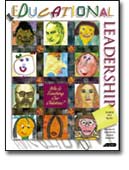A teacher affects eternity. He can never tell where his influence stops.—Henry Brooks Adams, 1907
Today, such sentiments of appreciation, often inscribed on teachers' coffee mugs and tote bags, are being voiced out loud. Politicians and the general public are increasingly vocal about the power of a good teacher.
Shortages can do that for a profession. A quick look at the headlines shows that districts and states are trying new ways to attract and reward good teachers—everything from granting bonuses for teaching in a poor district to awarding ten percent raises for ten years for becoming certified by the National Board for Professional Teaching Standards. Teachers of some subjects and grade levels can pick from multiple offers at job fairs.
But shortages have an unpleasant side, too. In Hawaii, where shortages are intense and the cost of living high, the state's entire cadre of teachers, including college professors, were on strike in mid-April this year, closing schools for more than 200,000 students. In other parts of the United States, unprecedented numbers of unlicensed teachers are filling vacancies, and out-of-field teaching is on the rise. Because of rapid teacher turnover, students in the Washington, D.C., area next school year will have a 1 in 6 chance of being taught by a teacher who is new to their school or new to the profession (Mathews, 2001).
As usual in education, solutions to the challenge of staffing our schools with good teachers differ drastically. Some reformers suggest short-circuiting the teacher education process, bypassing the "Mickey Mouse" requirements that they say most colleges have. Others suggest that in these days of high standards—when everyone from doctors to architects, veterinarians to hairdressers, must undergo a coherent program of study—short-term solutions are misguided. They suggest that, in addition to sound preparation, educators need internships, mentoring, testing, national certifications, and performance assessments to ensure that those who teach children are qualified to do so.
Because teaching is the largest profession in the United States, with more than 3 million people counting themselves as educators, we need multiple solutions to a difficult problem, especially in times of shortages. This issue of Educational Leadership looks at some of the proposals and programs for attracting and keeping high-quality educators. It also looks at what researchers and practitioners define as excellent teaching.
Recent research highlights three indicators of teacher quality that account for improved student achievement in math and science: classroom practices, professional development, and teacher education levels and experience. In a study of 7th and 8th grade students who took National Assessment of Educational Progress tests in math and science, Harold Wenglinksy (2000) found that students, regardless of their economic background or average class size, outperformed peers when they had a teacher who conducted hands-on learning activities and emphasized higher-order thinking skills. He recommends that teachers receive professional development that is closely tied to effective classroom practices and that teachers be rewarded for implementing such practices.
Wenglinsky concludes that policymakers are correct in emphasizing the importance of teaching in helping students meet high standards: Yet what really matters is not where teachers come from, but what they do in the classroom. And it is possible to make improvements in classroom practices with the current teaching force, irrespective of educational levels or other qualifications. The first step is for policymakers to stop scratching the surface of teaching and learning through superficial policies . . . and instead roll up their sleeves and dig into the nature of teaching and learning by influencing what occurs in the classroom. (p. 32)
David Berliner (p. 6) tells us that it takes from five to eight years to develop teaching expertise. If new teachers, regardless of their qualifications on entry, are to make a profound difference in students' lives, they will need incentives, decent salaries, and appreciation. Even more, they will need professional support.
